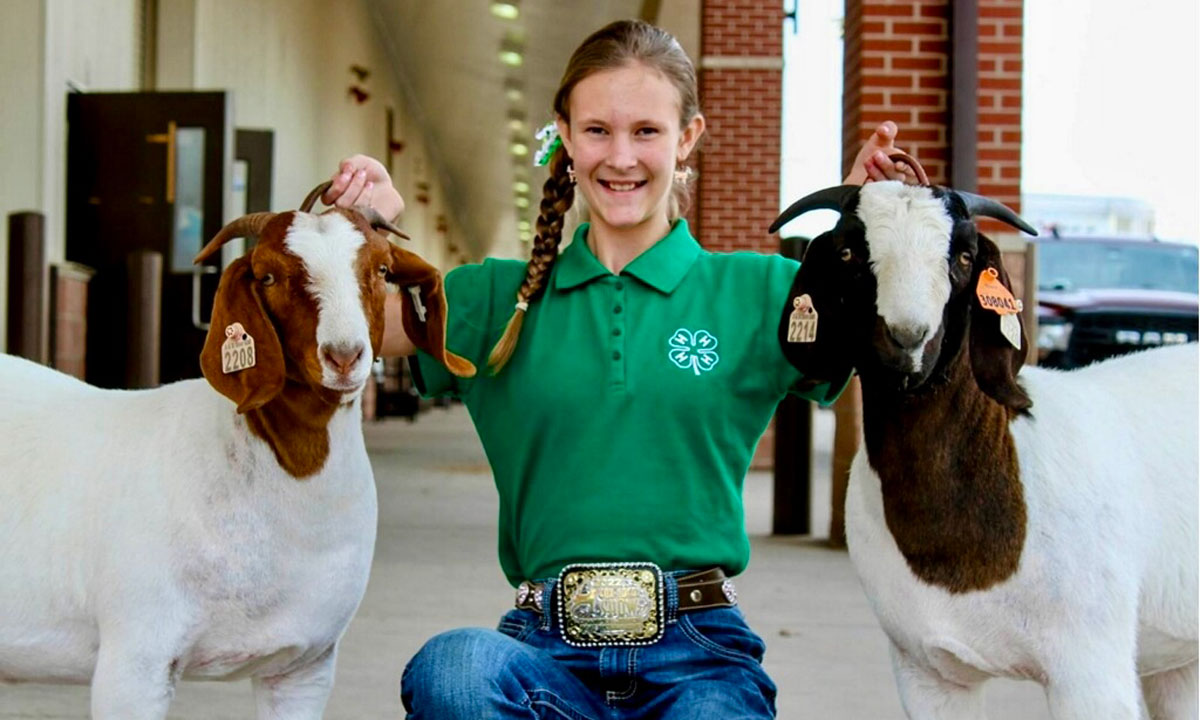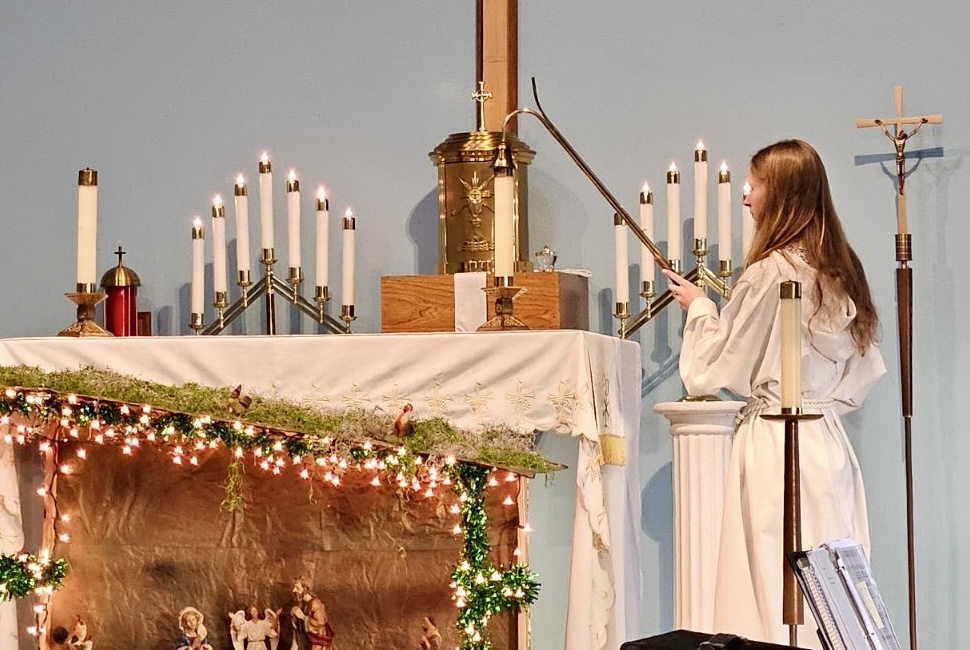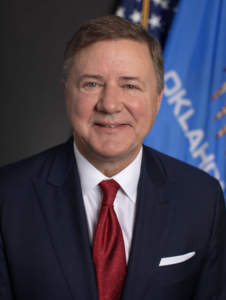Church v. State: Oklahoma’s High Court to Hear Precedent-Setting Religious Charter School Case
Even as state’s GOP attorney general fights the issue in court, St. Isidore of Seville Catholic Virtual School is taking applications for the fall.

Get stories like these delivered straight to your inbox. Sign up for The 74 Newsletter
Craig and Joy Stevens raise goats and chickens on a 60-acre homestead about 80 miles south of Oklahoma City — a 35-minute drive from the church where they attend mass every Sunday and more than an hour away from the closest Catholic school.
That’s why they’ve applied to send their daughter Chloe to St. Isidore of Seville Catholic Virtual School, a first-of-its kind religious charter at the center of a national dispute over separation of church and state.
Chloe is preparing for her confirmation at the end of April, a statement of her faith. Between Sundays, the family listens to a “Bible in a Year” podcast from a Minnesota priest with a large social media following. But her mother worries about students at her daughter’s public school being sexually active and wants her to get the “wholesome” influences she thinks only a Catholic education would provide.
“Kids at that school don’t have the same values that we have. They’re constantly on their phones,” Joy said. “I’m not doing this to be some kind of trailblazer; I’m doing this for my kid.”

Those are typically among the reasons many parents opt for private and faith-based schools. But on Tuesday, the Oklahoma Supreme Court will hear arguments in a precedent-setting case that examines whether publicly funded charter schools — which must uphold the same civil rights as traditional schools — can explicitly endorse religion. Republican Attorney General Gentner Drummond will argue that the state’s Virtual Charter School Board violated both state and federal law when it voted 3-2 to approve the school’s charter application last June. Attorneys for the school, however, say preventing it from opening this fall would be religious discrimination that flies in the face of recent U.S. Supreme Court opinions.
Parties in the case recognize the significance of the moment. “It’s part of history, so I’m glad I’m going to be sitting there to watch how this unfolds,” said Robert Franklin, chair of the virtual charter board and one of two members to vote against the application. He supports school choice, but said “in Oklahoma we’re pushing this as far and as fast as we possibly can. I think it’s going to have some significant consequences.”
Notably, none of the three members who voted in favor of the school remain on the board. Republican Gov. Kevin Stitt appointed two, Nellie Tayloe Sanders and Brian Bobek, to his administration. The third, Scott Strawn, left to work at Baylor University in Texas.
To many observers, Bobek, who Stitt previously appointed to the state board of education, should not have been able to vote on the application. Republican House Speaker Charles McCall appointed him to the charter board just days before the vote, replacing a retired superintendent. Franklin asked him to recuse himself, but Bobek refused. According to Drummond’s office, his appointment should not have taken effect until five months later.
One of the most outspoken evangelists for the school, state Superintendent Ryan Walters, also won’t be represented before the court. But that’s not for a lack of trying. Walters, who dismisses the separation of church and state as a “radical myth,” failed three times to convince the court to carve out some time for the state education department during Tuesday’s oral arguments. He reasoned that since he supports the school, Drummond’s position isn’t the only one that matters. The school, however, joined Drummond in opposing the superintendent’s request, and Chief Justice M. John Kane turned Walters down.
The Catholic church’s effort to open St. Isidore — named for the patron saint of the internet — has split constitutional scholars and school choice experts from the start.
Religious freedom advocates say recent U.S. Supreme Court decisions laid the foundation for the nation’s first religious charter school. In Espinoza v. Montana Department of Revenue — a 2020 opinion about whether a family could use a tax credit scholarship at a faith-based school — the court said a “state need not subsidize private education. But once a state decides to do so, it cannot disqualify some private schools solely because they are religious.”
That’s where the school’s argument breaks down, Drummond wrote in his lawsuit.

“St. Isidore is not a ‘private school.’ Under Oklahoma law, it is [a] public school,” he wrote. “Therefore, these recent U.S. Supreme Court cases have no relevance to this dispute.”
Despite Oklahoma being a deeply red state, its high court tends to lean more to the left. Regardless of how the Oklahoma justices rule, however, observers expect the issue to end up in federal court.
Issues of discrimination
Drummond’s lawsuit is not the only effort to stop the school from opening Aug. 12. Public school advocates, parents and religious leaders filed an initial lawsuit in October against the charter board, Walters and the state education department.
The case “raises important issues” about discrimination not addressed by Drummond’s lawsuit, said Alex Luchenitser, associate vice president of Americans United for Separation of Church and State, one of the organizations representing the plaintiffs.
The school, which is holding an admissions lottery until Wednesday, will accept students with disabilities, but its handbook says that services or accommodations for students can’t be “in opposition to church teaching.” The Archdiocese of Oklahoma City declined to elaborate. In addition, the school might not accept students whose services would “significantly alter the regular classroom process.”
Last year, before the board approved the school, Andrea Kunkel, general counsel for a state school administrators organization, warned that charter schools can’t ignore special education law.
“Although St. Isidore may not have readily available all services that future students may need, it has the legal obligation to either provide and pay for those services through a different model or arrange for them to be provided by someone else and pay for them,” she wrote in a letter to the board.
LGBTQ students can attend, but staff will only use pronouns and nicknames that match their biological sex at birth, a stance that echoes Walters’s position on gender identity issues. The state board passed a rule in October giving members final say over students’ requests to change sex or gender designations in school records. One transgender student is suing over the rule. The charter school will also enforce a dress code requiring clothing to “correspond to the student’s biological sex.”
Those rules “are strong grounds for blocking the planned operation and state funding of the school,” Luchenitser said. Their case, he added, reflects the views of taxpayers, parents and others “who will be harmed if St. Isidore is allowed to operate and receive state funds.”
No hearings have been held in that case, which is in state court, but last week, the defendants asked Judge Richard Ogden to dismiss it.
St. Isidore’s student/parent handbook suggests that students who don’t adapt well to online learning will be encouraged to return to their district schools.

But Joy Stevens expects that her daughter, who has been homeschooled and attended another Oklahoma virtual charter school during the pandemic, will do well.
Like many students who prefer online school, Chloe has a hectic schedule. The 13-year-old is a competitive gymnast, spending several hours a week in training. She is learning to fly a plane and helps tend to her family’s farm animals and garden.
Her mother says the family would have used Oklahoma’s tax credit scholarship program to pay for private school tuition.
But “there’s just no option out here,” Stevens said. “If Chloe is accepted or chosen in the lottery, it is a sure sign of God’s will for her and our family.”
Get stories like these delivered straight to your inbox. Sign up for The 74 Newsletter

;)
